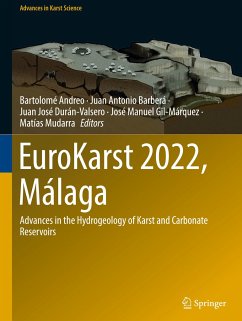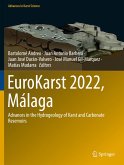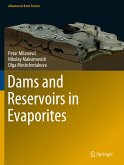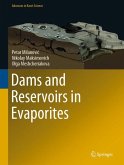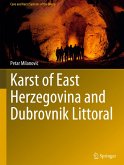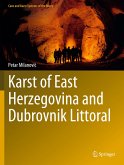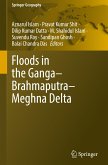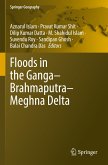EuroKarst 2022, Málaga
Advances in the Hydrogeology of Karst and Carbonate Reservoirs
Herausgegeben:Andreo, Bartolomé; Barberá, Juan Antonio; Durán-Valsero, Juan José; Gil-Márquez, José Manuel; Mudarra, Matías
EuroKarst 2022, Málaga
Advances in the Hydrogeology of Karst and Carbonate Reservoirs
Herausgegeben:Andreo, Bartolomé; Barberá, Juan Antonio; Durán-Valsero, Juan José; Gil-Márquez, José Manuel; Mudarra, Matías
- Gebundenes Buch
- Merkliste
- Auf die Merkliste
- Bewerten Bewerten
- Teilen
- Produkt teilen
- Produkterinnerung
- Produkterinnerung
This book covers advances in the field of karst from a variety of perspectives to facilitate knowledge and promote interaction between disciplines. New methods are addressed that advance data collection, analysis, and interpretation in a wide range of karst contexts. Case studies are presented to provide examples of advancing science. Issues addressed include karst hydrogeology (water resources assessment, groundwater pollution and protection), methods to study karst aquifers (based on hydrodynamic, hydrochemistry, isotopes, dye tracing, geophysical surveys, and modeling techniques), karst…mehr
Andere Kunden interessierten sich auch für
![EuroKarst 2022, Málaga EuroKarst 2022, Málaga]() EuroKarst 2022, Málaga177,99 €
EuroKarst 2022, Málaga177,99 €![Dams and Reservoirs in Evaporites Dams and Reservoirs in Evaporites]() Petar MilanovicDams and Reservoirs in Evaporites77,99 €
Petar MilanovicDams and Reservoirs in Evaporites77,99 €![Dams and Reservoirs in Evaporites Dams and Reservoirs in Evaporites]() Petar MilanovicDams and Reservoirs in Evaporites108,99 €
Petar MilanovicDams and Reservoirs in Evaporites108,99 €![Karst of East Herzegovina and Dubrovnik Littoral Karst of East Herzegovina and Dubrovnik Littoral]() Petar MilanovicKarst of East Herzegovina and Dubrovnik Littoral116,99 €
Petar MilanovicKarst of East Herzegovina and Dubrovnik Littoral116,99 €![Karst of East Herzegovina and Dubrovnik Littoral Karst of East Herzegovina and Dubrovnik Littoral]() Petar MilanovicKarst of East Herzegovina and Dubrovnik Littoral85,99 €
Petar MilanovicKarst of East Herzegovina and Dubrovnik Littoral85,99 €![Floods in the Ganga-Brahmaputra-Meghna Delta Floods in the Ganga-Brahmaputra-Meghna Delta]() Floods in the Ganga-Brahmaputra-Meghna Delta116,99 €
Floods in the Ganga-Brahmaputra-Meghna Delta116,99 €![Floods in the Ganga-Brahmaputra-Meghna Delta Floods in the Ganga-Brahmaputra-Meghna Delta]() Floods in the Ganga-Brahmaputra-Meghna Delta116,99 €
Floods in the Ganga-Brahmaputra-Meghna Delta116,99 €-
-
-
This book covers advances in the field of karst from a variety of perspectives to facilitate knowledge and promote interaction between disciplines. New methods are addressed that advance data collection, analysis, and interpretation in a wide range of karst contexts. Case studies are presented to provide examples of advancing science. Issues addressed include karst hydrogeology (water resources assessment, groundwater pollution and protection), methods to study karst aquifers (based on hydrodynamic, hydrochemistry, isotopes, dye tracing, geophysical surveys, and modeling techniques), karst geomorphology and landscape, mining and engineering in karst media (tunnels, dams, etc.), and karst cavities (touristic caves, natural heritage).
This book is a resource for scientists around the world to compare problems, results, and solutions. Likewise, the examples included are used in policy decision making in karst regions. Finally, the contributions are used as a tool for university teaching.
This book is a resource for scientists around the world to compare problems, results, and solutions. Likewise, the examples included are used in policy decision making in karst regions. Finally, the contributions are used as a tool for university teaching.
Produktdetails
- Produktdetails
- Advances in Karst Science
- Verlag: Springer / Springer International Publishing / Springer, Berlin
- Artikelnr. des Verlages: 978-3-031-16878-9
- 1st edition 2023
- Seitenzahl: 268
- Erscheinungstermin: 2. Januar 2023
- Englisch
- Abmessung: 285mm x 215mm x 20mm
- Gewicht: 993g
- ISBN-13: 9783031168789
- ISBN-10: 303116878X
- Artikelnr.: 65001924
- Herstellerkennzeichnung Die Herstellerinformationen sind derzeit nicht verfügbar.
- Advances in Karst Science
- Verlag: Springer / Springer International Publishing / Springer, Berlin
- Artikelnr. des Verlages: 978-3-031-16878-9
- 1st edition 2023
- Seitenzahl: 268
- Erscheinungstermin: 2. Januar 2023
- Englisch
- Abmessung: 285mm x 215mm x 20mm
- Gewicht: 993g
- ISBN-13: 9783031168789
- ISBN-10: 303116878X
- Artikelnr.: 65001924
- Herstellerkennzeichnung Die Herstellerinformationen sind derzeit nicht verfügbar.
Part I: Karst hydrogeology and methods to study karst aquifers.- Initiative to select, label and protect the world's most important karst springs.- Flood hazard in the Classical Karst: the case of Mucille polje (NE Italy).- Impacts of Recharge and Discharge on Sustainability of the Trinity Aquifers of Central Texas.- Hydrodynamic characterization of sources of karst: case of the source of Ain Sebou (middle Atlas, central, Morocco).- Surprising time lag between precipitation and groundwater levels in a karst aquifer of Kopa Mt. (Slovakia).- Updating the water budget of the Gran Sasso carbonate fractured/karstified aquifer (Central Italy) for a sustainable management of groundwater resources.- Combining quantitative analysis tools (cross-correlation analysis and dye tracer tests) to assess response times in karst aquifers.- Quantitative and Geochemical Characterization of the Mokra Karst Aquifer (SE Serbia) by Time Series Analysis and Stochastic Modelling.- Characterization of the isotopic signature of effective rainfall (d18O, d2H) to constrain the groundwater re-charge zones in a Mediterranean karst aquifer.- Application of statistical approaches to piezometry to improve the understanding of the karst aquifer hydrodynamic behavior at the Cadarache CEA center (France).- Characterization of hydrogeological processes of karst-influenced multi-layered aquifers of basin edge using statistical and geochemical approaches (northern Aquitaine basin, France).- Implications of Tryptophan-Like-Fluorescence long term monitoring for bacterial detection in a mountainous rural karst aquifer.- What microbial signature means in terms of groundwater dynamics, vulnerability and residence time - Comparison of shallow and deep karst resources.- Deriving major ion concentrations at high resolution from continuous electrical conductivity measurements in karst systems.- ydrogeological characterization and modeling at two test sites of the Apulian karst (Southern Italy).- Prediction of future interactions between karst and river regarding to climate change based on IPCC scenarios: application to a Mediterranean french river basin (Cèze).- A smart analytical and numerical interpretation of injection tests in unsaturated, fractured and karstified carbonate reservoirs.- On the choice of performance metric for model calibration scheme using discharge age-information.- Understanding water table fluctuations in a karstic semiarid Mediterranean aquifer through numerical modelling: the case of Almudaina-Segaria aquifer.- Part II: Karst caves, geomorphology, landscape and natural heritage.- Understandig karst conduit size distribution by numerical speleogenesis modeling.- Unroofed cave - an underground form on the karst surface.- Study of Rull Cave dynamics to understand the complex relationships between soil, cave and external atmosphere.- Hydrological and environmental dynamics in the Güixas show cave: tourist exploitation and flood risk management.- Understanding morphosedimentary changes and extreme past floods: the case of Ojo de Valjunquera cave (Iberian Range, Spain).- Identification of near-surface karst cavities using the posterior population expansion inverse method applied to electrical resistivity data.- Use of terrestrial LiDAR scanner for monitoring of ice thickness in ice caves; examples from Slovenia.- Evidences of past and present cave hypogenesis in the Serrezuela de Carratraca Massif (Málaga, Southern Spain).- Microstratigraphic analysis of a speleothem from the Nerja Cave (Málaga, Southern Spain).- Gypsum dissolution rate, new data and challenges.- A Multidisciplinary investigation of karstic subsidence in a Madrid urbanization #148.- Morphometric comparison of dolines in three karst landscapes developed on different lithologies.- The importance of snow in the hydrogeology of a high relief karst system: Sierra de Tendeñera, in the Pyrenees Mountain range (Huesca, Northern Spain).- The link between man and water in karst, through examples from Apulia (S Italy).- Hydrogeological setting of Las Loras UNESCO Global Geopark (Palencia-Burgos, Spain): State of knowledge and needs for water resources sustainability research.- Preliminary hydrogeological investigations for sustainable development in the Courel Mountains UNESCO Global.
Part I: Karst hydrogeology and methods to study karst aquifers.- Initiative to select, label and protect the world's most important karst springs.- Flood hazard in the Classical Karst: the case of Mucille polje (NE Italy).- Impacts of Recharge and Discharge on Sustainability of the Trinity Aquifers of Central Texas.- Hydrodynamic characterization of sources of karst: case of the source of Ain Sebou (middle Atlas, central, Morocco).- Surprising time lag between precipitation and groundwater levels in a karst aquifer of Kopa Mt. (Slovakia).- Updating the water budget of the Gran Sasso carbonate fractured/karstified aquifer (Central Italy) for a sustainable management of groundwater resources.- Combining quantitative analysis tools (cross-correlation analysis and dye tracer tests) to assess response times in karst aquifers.- Quantitative and Geochemical Characterization of the Mokra Karst Aquifer (SE Serbia) by Time Series Analysis and Stochastic Modelling.- Characterization of the isotopic signature of effective rainfall (d18O, d2H) to constrain the groundwater re-charge zones in a Mediterranean karst aquifer.- Application of statistical approaches to piezometry to improve the understanding of the karst aquifer hydrodynamic behavior at the Cadarache CEA center (France).- Characterization of hydrogeological processes of karst-influenced multi-layered aquifers of basin edge using statistical and geochemical approaches (northern Aquitaine basin, France).- Implications of Tryptophan-Like-Fluorescence long term monitoring for bacterial detection in a mountainous rural karst aquifer.- What microbial signature means in terms of groundwater dynamics, vulnerability and residence time - Comparison of shallow and deep karst resources.- Deriving major ion concentrations at high resolution from continuous electrical conductivity measurements in karst systems.- ydrogeological characterization and modeling at two test sites of the Apulian karst (Southern Italy).- Prediction of future interactions between karst and river regarding to climate change based on IPCC scenarios: application to a Mediterranean french river basin (Cèze).- A smart analytical and numerical interpretation of injection tests in unsaturated, fractured and karstified carbonate reservoirs.- On the choice of performance metric for model calibration scheme using discharge age-information.- Understanding water table fluctuations in a karstic semiarid Mediterranean aquifer through numerical modelling: the case of Almudaina-Segaria aquifer.- Part II: Karst caves, geomorphology, landscape and natural heritage.- Understandig karst conduit size distribution by numerical speleogenesis modeling.- Unroofed cave - an underground form on the karst surface.- Study of Rull Cave dynamics to understand the complex relationships between soil, cave and external atmosphere.- Hydrological and environmental dynamics in the Güixas show cave: tourist exploitation and flood risk management.- Understanding morphosedimentary changes and extreme past floods: the case of Ojo de Valjunquera cave (Iberian Range, Spain).- Identification of near-surface karst cavities using the posterior population expansion inverse method applied to electrical resistivity data.- Use of terrestrial LiDAR scanner for monitoring of ice thickness in ice caves; examples from Slovenia.- Evidences of past and present cave hypogenesis in the Serrezuela de Carratraca Massif (Málaga, Southern Spain).- Microstratigraphic analysis of a speleothem from the Nerja Cave (Málaga, Southern Spain).- Gypsum dissolution rate, new data and challenges.- A Multidisciplinary investigation of karstic subsidence in a Madrid urbanization #148.- Morphometric comparison of dolines in three karst landscapes developed on different lithologies.- The importance of snow in the hydrogeology of a high relief karst system: Sierra de Tendeñera, in the Pyrenees Mountain range (Huesca, Northern Spain).- The link between man and water in karst, through examples from Apulia (S Italy).- Hydrogeological setting of Las Loras UNESCO Global Geopark (Palencia-Burgos, Spain): State of knowledge and needs for water resources sustainability research.- Preliminary hydrogeological investigations for sustainable development in the Courel Mountains UNESCO Global.

